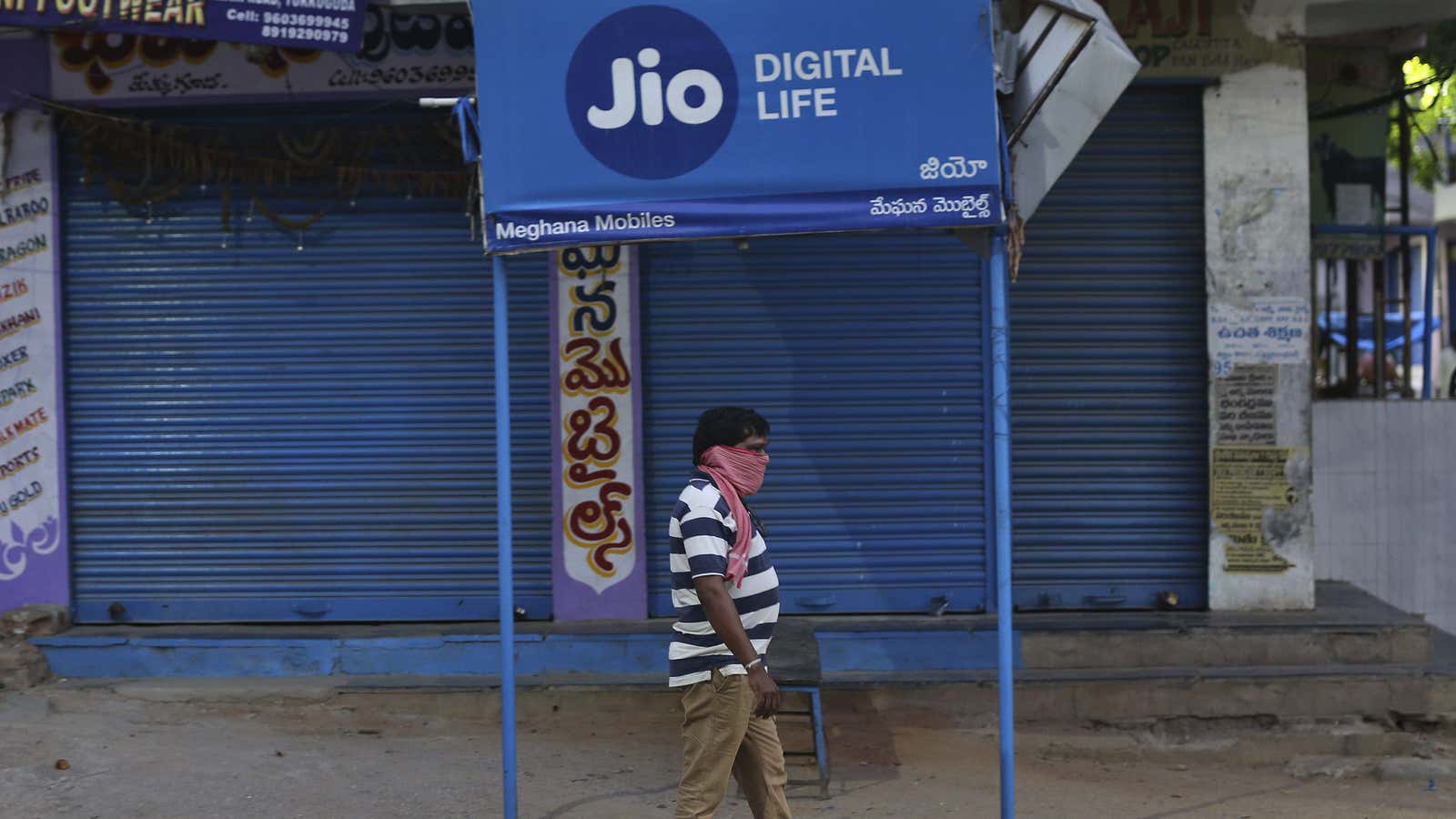Facebook’s deal with Reliance Jio may have set the stage for Mark Zuckerberg’s next major innings in India.
The California-based company, which was launched globally in 2006 and set up its first India office in 2010, has had a very bumpy ride in the country so far. Even as India makes for its largest user base, Facebook has been under fire for other reasons, including issues related to net neutrality and Pegasus spyware.
On April 22, it announced a $5.7 billion deal to buy a 9.99% stake in Reliance Jio, the telecom venture of India’s richest man, Mukesh Ambani. This is the most expensive purchase by Facebook since it bought WhatsApp for $16 billion in February 2014. And experts believe it’s totally worth it.
“This deal could potentially serve as an added incentive for Facebook to leverage Jio’s user base and allay some fears by investing in India’s growth story,” Kiran Kumar, research manager at Frost & Sullivan’s tech division, said.
Facebook has no option but to get its act together in India. After all the country contributes over 250 million users to the social networking site, over 400 million to its messaging app WhatsApp, and over 80 million to its photo-sharing app Instagram.
A brief history of Facebook’s India woes
February 2016: The Telecom Regulatory Authority of India (Trai) kills off Facebook’s controversial Free Basics programme, saying it fans discriminatory access to data services. Net neutrality activists had been claiming that Free Basics, which originally launched as Internet.org in February 2015, violated the open nature of the web since it would allow first-time internet users to access only services approved by Facebook. Despite the criticism, the company had been rallying behind the cause, reportedly spending upwards of Rs300 crore (around $40 million) on advertising campaigns.
December 2017: A Bloomberg investigation reveals that Facebook helped develop prime minister Narendra Modi’s online presence ahead of the 2014 elections with the aid of “troll armies” that spread misinformation and extremist ideologies.
March-July 2018: In March, the information technology ministry seeks clarity on whether personal data of Indian users were compromised when political consultancy Cambridge Analytica harvested 50 million Facebook users’ data to benefit various political campaigns, including Donald Trump’s US presidential campaign in 2016. The authority also asked what steps Facebook was taking to prevent the misuse of Indian users’ data or manipulation in the Indian electoral process. Four months later, with no sufficient communication from Zuckerberg’s firm, the Indian government asks the Central Bureau of Investigation to probe Cambride Analytica’s misuse of Facebook user data in India.
September 2018: Data of 50 million Facebook users exposed following a massive security breach by unknown hackers, with a significant number of affected users hailing from India.
April 2019: Zuckerberg pushes back against India’s data localisation demands. The Reserve Bank of India (RBI) guidelines say all digital payment firms like Google Pay, WhatsApp, and others must store data locally for their businesses. “More countries following the approach of authoritarian regimes adopting strict data localisation policies where governments can more easily access people’s data, and I’m highly concerned about that future,” the Facebook CEO argues. WhatsApp’s payment service has been hanging fire since.
October 2019: Pegasus, a technology developed by the Israeli cyber-security firm NSO, hacked thousands of people, including at least two dozen journalists, lawyers, and activists in India, via “exploit links” and missed calls on WhatsApp.
The way forward
It’s no secret that Facebook’s funds will help Reliance move towards a debt-free future, but the relationship is symbiotic. Jio has a lot to offer, too.
For starters, the telco can help the Menlo Park behemoth kickstart a number of dormant services in India. Take WhatsApp Pay, for example, which began beta testing two years ago but has not yet seen the light of day.
“The deal has become even more crucial for Facebook as its WhatsApp is planning to roll out payments app in India and with Jio as its local partner will be pivotal in navigating the regulatory hurdles,” said Aurojyoti Bose, lead analyst at data and analytics company GlobalData.
Separately, to take on TikTok’s skyrocketing popularity, Facebook could piggyback on Jio’s 388 million-strong subscribers to finally debut its own short-form viral video app, Lasso, in India, Bose suggested.
Already, Facebook has said it is foraying into new sectors such as India’s burgeoning online grocery landscape. It plans to combine WhatsApp with Reliance Retail’s JioMart, creating a formidable rival for the likes of BigBasket and Grofers in the country.
Of course, the details are yet to be ironed out. “It will be interesting to see the perceptible difference it makes to consumers as well as local traders,” said Vidhyashanker, head of corporate development at Chennai-based IT services company Ninestars Technologies. He asked a bunch of pointed questions about the eventual implementation: How does one rank two adjacent petty shops to deliver an order from the same pin code? What’s the onus on the platform itself against transactions? Who sets the technological, legal, and commercial policy imperatives in these cases?
Nevertheless, with Jio’s hand-holding, Facebook may have a more smooth-sailing experience in India from now on.
